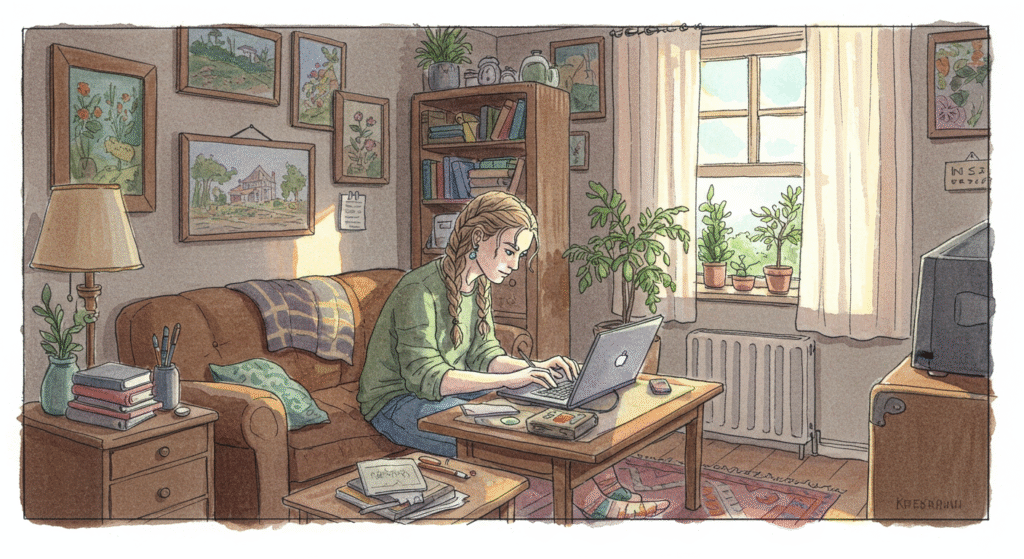
Whether you’re dreaming of publishing your first novel, building a freelance writing business, or expanding your readership, one truth remains: you need an author platform.
Gone are the days when writers could rely solely on publishers or word of mouth to reach readers. Today, visibility and connection are everything. Your author platform is your bridge between your writing and your audience — the foundation upon which your creative career grows.
But if you’re just starting out, the idea of building that platform can feel overwhelming. Where do you begin? What matters most? How do you do it without feeling like a pushy marketer?
This guide will walk you step-by-step through how to build an authentic, sustainable author platform from scratch — even if you have zero followers right now.
What is an Author Platform?
An author platform is the collection of tools, spaces, and relationships that allow you to connect directly with your readers. It’s not just social media followers or a website. It’s the entire ecosystem of how you present yourself and your work to the world.
Think of your platform as a combination of three elements:
- Visibility – How and where people find you online.
- Credibility – Why they trust you and your writing voice.
- Community – How you engage and build relationships with readers and peers.
Together, these elements form the foundation of a writing career that isn’t dependent on luck or algorithms — but on connection, consistency, and authenticity.
Step 1: Define Who You Are as a Writer
Before you build anything, you need clarity.
Ask yourself:
- What kind of writer am I?
- What stories or topics do I care about most?
- Who do I want to reach — and why?
Defining your writer identity helps everything else fall into place. Your tone, your content, your website, even your colors and imagery — all flow from understanding what makes your writing voice unique.
For example, a fantasy author might use imagery that evokes mystery and adventure, while a nonfiction writer on mental health might focus on calm, compassionate tones. Your brand should reflect your writing style and the emotional space you occupy.
SEO Tip: Use clear keywords like fantasy author, romance writer, or writing coach in your bio and website copy to help your target audience find you through search engines.
Step 2: Create Your Author Website
Your website is your home base — a digital headquarters where readers, publishers, and collaborators can find everything about you in one place.
At a minimum, your author website should include:
- About Page: A compelling bio written in your natural voice.
- Books or Writing Samples Page: Highlight your published work, even if it’s short stories or blog posts.
- Blog Section: Regular content that provides value, insight, or connection to your readers.
- Contact Page: A simple way for readers or media to reach you.
If you’re just starting out, you can build a professional-looking site with platforms like WordPress, Squarespace, or Wix. WordPress remains the best option for SEO optimization and scalability.
Pro Tip: Use an SEO plugin like Yoast SEO or Rank Math to optimize your meta descriptions, image alt tags, and title keywords. This helps Google understand who you are and what your site offers.
Example:
If you’re a fantasy author, you might use a title like:
“[Your Name] – Fantasy Author & World-Building Enthusiast | Official Website”
Step 3: Start Building Your Email List Early
Social media is valuable, but algorithms change overnight. Your email list, however, is something you own — and it’s one of the most effective ways to stay connected with your readers.
Start collecting email addresses from day one, even if your list starts with ten people. Offer a freebie — a short story, a writing guide, or a sneak peek at your upcoming project — in exchange for a reader’s email.
Use services like MailerLite, ConvertKit, or Substack to manage your list. These tools make it easy to create sign-up forms, automate welcome emails, and track engagement.
SEO Tip: Include opt-in forms throughout your website with calls-to-action like:
“Join my newsletter for exclusive updates and writing tips.”
Your mailing list is where true community begins — one genuine connection at a time.
Step 4: Choose the Right Social Media Platforms
Not every platform is right for every writer. You don’t need to be everywhere; you just need to be where your readers are.
- Instagram works well for visual storytelling, book aesthetics, and connecting with #Bookstagram communities.
- X (formerly Twitter) is ideal for networking with other writers, agents, and publishers.
- TikTok (BookTok) has exploded in influence, especially for YA and romance writers.
- Facebook remains a strong platform for building private reader groups or event communities.
- LinkedIn is underrated for nonfiction authors and freelance writers building authority.
Pick one or two to focus on consistently. Post authentic, meaningful content — writing tips, behind-the-scenes insights, book progress updates — and engage in conversation.
Avoid treating social media like a megaphone. Instead, think of it as a campfire where you invite others to gather, share, and connect.
Pro Tip: Use scheduling tools like Buffer or Later to plan content in advance, so you can spend more time writing.
Step 5: Start a Blog or Content Stream
Blogging isn’t dead — it’s just evolved. A regularly updated blog on your author site is one of the best ways to drive SEO traffic, establish authority, and build your voice.
Write about topics that connect to your niche. For example:
- A mystery author might blog about unsolved historical crimes.
- A memoirist might share personal essays about creativity and memory.
- A writing coach could post tips about storytelling and publishing.
Each blog post adds searchable content to your site, attracting readers organically over time.
SEO Tip: Use long-tail keywords like “how to write a mystery novel,” “fiction worldbuilding tips,” or “how to publish your first book.” Include these phrases naturally in your headers and first 100 words.
Over time, your blog becomes a magnet for readers who share your interests — and many of them will eventually become fans of your books.
Step 6: Network Authentically
Building an author platform isn’t just about promoting yourself — it’s about relationships.
Engage with other writers, editors, and readers in online writing communities, critique groups, or literary Twitter threads. Comment thoughtfully on others’ work. Share resources without expecting anything in return.
Networking works best when it’s grounded in genuine curiosity and generosity, not self-promotion.
Resource Suggestions:
- Writing communities: Scribophile, Critique Circle, Absolute Write, and Reddit’s r/writing.
- Professional networks: SCBWI (for children’s authors), Authors Guild, or local writing associations.
Step 7: Offer Value, Not Just Promotion
One of the most common mistakes writers make when building a platform is focusing too much on selling and not enough on serving.
Your readers don’t just want to hear about your next release — they want to connect with your worldview, your journey, your insights.
Offer them something valuable:
- Behind-the-scenes peeks at your creative process.
- Writing advice you’ve learned the hard way.
- Inspirational content about resilience and creativity.
- Honest reflections about the ups and downs of your writing life.
When people come to your platform to feel something, they’ll stay for everything else you create.
Step 8: Stay Consistent (and Patient)
Building an author platform is not a sprint; it’s a marathon.
You won’t gain a thousand followers or a viral post overnight — and that’s okay. What matters is consistency.
Post regularly. Engage authentically. Update your website and newsletter monthly. Over time, the steady accumulation of effort builds something powerful: trust.
Trust leads to readership. Readership leads to opportunity.
Remember, the writers who succeed long-term aren’t the ones who market the hardest — they’re the ones who show up consistently and stay true to their voice.
Step 9: Track What Works (and Adjust)
Once you have your systems in place, track your progress.
Use Google Analytics or WordPress Jetpack to see which posts attract visitors. Monitor email open rates and engagement metrics. Notice which social media posts generate meaningful responses.
This data helps you refine your strategy without guessing. You’ll learn where your readers are, what they care about, and how to better serve them.
Think of your platform as a living ecosystem — it grows, adapts, and evolves with you.
Final Thoughts: Your Platform Is Your Promise
At its heart, your author platform isn’t about algorithms or follower counts — it’s about connection.
It’s your promise to your readers: I’ll keep showing up. I’ll keep writing. I’ll keep sharing stories that matter.
You don’t need to have a massive audience to start. You just need to begin — one reader, one post, one email at a time.
Your words deserve to be found. Building your platform is simply the process of clearing the path.
So take a deep breath. Claim your digital space. Start today. Because your story isn’t just worth writing — it’s worth being heard.
